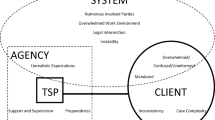Abstract
This paper focuses on the results of an exploratory study conducted to describe the characteristics of the families and children served in one rural state's intensive child case management program for families with children with serious emotional and behavioral disturbances, and to explore the relationship between these characteristics and case managers' contact with families. Findings suggest that case managers spend more time with families of boys, and with children exhibiting more severe difficulties in daily functioning. Implications for the provision of intensive child case management services are discussed.
Similar content being viewed by others
References
Behar, L. (1985). Changing patterns of state responsibility: A case study of North Carolina. Journal of Clinical Child Psychology, 14, 188–195.
Behar, L. (1988). An integrated state system of services for seriously disturbed children. In J. Looney (Ed.): Chronic mental illness in children and adolescents. Washington, DC: American Psychiatric Press.
Bickman, L., & Rog, D. (1995). Children's mental health service: Research, policy, and evaluation. Children's mental health services, Volume 1. Thousand Oaks, CA: Sage.
Burchard, J., Schaefer, M., Harrington, N., Rogers, J., Welkowitz, J., & Tighe, T. (1991). An evaluation of the community integration demonstration project. The University of Vermont, Burlington.
Burns, B.J. & Goldman, S.K. (Eds.) (1999). Promising practice in wraparound for children with serious emotional disturbance and their families. Systems of Care: Promising Practice in Children's Mental Health, 1998 Series, Volume IV. Washington, DC: Center for Effective Collaboration and Practice, American Institutes for Research.
Annie E. Casey Foundation. (1992). Focus, 2, 2–6.
Dougherty, D., Saxe, L., Cross, T., & Silverman, N. (1989). Children's mental health: Problems and services. Durham, NC: Duke University Press.
Early, T. & Poertner, J. (1995). Examining current approaches to case management for families with children who have serious emotional disorders. In B. Friesen & J. Poertner (Eds.): From case management to service coordination for children with emotional, behavioral, or mental disorders (pp. 37–59). Baltimore, MD: Brooks.
Epstein, M.H., Nelson, C.M., Polsgrove, L., Coutinho, M., Cumblad, C., & Quinn, K. (1993). A comprehensive community-based approach to serving students with emotional and behavioral disorders. Journal of Emotional and Behavioral Disorders, 1(2), 127–133.
Evans, M.E. & Boothroyd, R.A. (1997). Development and implementation of an experimental study of the effectiveness of intensive in-home crisis services for children and their families. Journal of Emotional and Behavioral Disorders, 5(2), 93–105.
Evans, M.E., Dollard, N., & McNulty, T.L. (1992). Characteristics of seriously emotionally disturbed youth with and without substance abuse in intensive case management. Journal of Child and Family Studies, 1(3), 305–314.
Friesen, B. & J. Poertner, J. (1995). From case management to service coordination for children with emotional, behavioral, or mental disorders. Baltimore, MD: Brooks.
Homonoff, E. & Maltz, P. (1991). Developing and maintaining a coordinated system of community-based services to children. Community Mental Health Journal, 27, 347–357.
Knitzer, J. (1982). Unclaimed children. Washington, DC: Children's Defense Fund.
Koren, P.E., & Paulson, R.I. (1997). Service coordination in children's mental health: An empirical study from the caregiver's perspective. Journal of Emotional and Behavioral Disorders, 5(3), 162–173.
Rivera, V.R. & Kutash, K. (1994). Case Management. In V.R. Rivera & K. Kutash: Components of a system of care: What does the research say? Tampa, FL: University of South Florida, Florida Mental Health Institute, Research and Training Center for Children's Mental Health.
Ronnau, J. (1991). Family advocacy services: A strengths model of case management. Paper presented at the second annual national conference, Intensive case management for families with children with emotional, behavioral, and neurological disabilities. Portland, OR.
Ronnau, J. (1992). A strengths approach to children with emotional disabilities. In D. Saleebey (Ed.): The Strengths perspective in social work practice. New York: Longman.
Rose, S. (1992). Case management and social work practice. New York: Longman.
Saleebey, D. (1992). The strengths perspective in social work practice. New York: Longman.
Saxe, L., Cross, T., & Silverman, N. (1988). Children's mental health: The Gap between what we know and what we do. American Psychologist, 43, 800–807.
Sharma, J. Epstein, M. McKelvey, J., & Frankenberry, F. (1995). The Daily activities of staff employed in a family support program located in an urban setting. Paper presented at the 9th Annual Research Conference: A system of care for children's mental health. Tampa, Fl.
Woodruff, D.W., Osher, D., Hoffman, C.C., Gruner, A., King, M.A., Snow, S.T., & McIntire, J.C. (1999). The role of education in a system in care: Effectively serving children with emotional or behavioral disorders. Systems of Care: Promising Practices in Children's Mental Health, 1998 Series, Volume III. Washington, DC: Center for Effective Collaboration and Practice, American Institutes for Research.
Author information
Authors and Affiliations
Rights and permissions
About this article
Cite this article
Werrbach, G.B. Providing Intensive Child Case Management Services: How Do Case Managers Spend Their Time?. Child and Adolescent Social Work Journal 19, 473–486 (2002). https://doi.org/10.1023/A:1021197730381
Issue Date:
DOI: https://doi.org/10.1023/A:1021197730381




